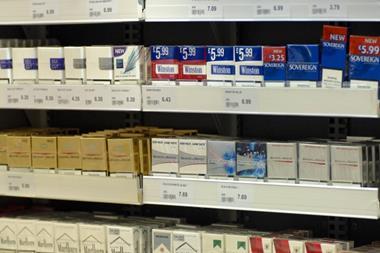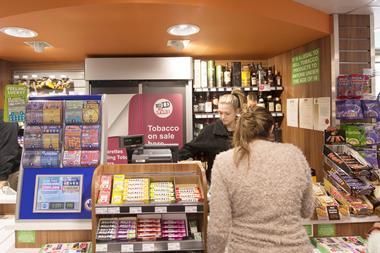Preparations are under way as the tobacco industry braces itself for a fresh storm of legislation set to have a profound impact on stores
It’s been less than a year since the last wave of tobacco legislation, in the shape of the tobacco display ban, was imposed on c-stores. And just over 10 months later, it’s about to get another shake-up - arguably its biggest yet.
On 20 May this year new European Union tobacco legislation, known as the Tobacco Products Directive (EUTPD), will come into force for tobacco manufacturers.
After this date, manufacturers will no longer be able to produce: cigarettes in packs of less than 20; roll your own (RYO) tobacco in pouches of less than 30g; cigarette slide packs; or cigarette slim packs.
At the same time, and in addition to the new EU rules, the UK government has passed plain packaging legislation which will put an end to branded packs and pricemarking.
Retailers will have a year from May 2016 to sell through old stock, so from 20 May 2017 the sale of all small, slide and branded packs will be illegal. Menthol will also be banned from May 2020.
The loss of 10-packs will certainly have an impact on adult smokers and retailers, given they account for 34% of all cigarette packs sold in the UK. And with 62% of all 10- stick packs currently sold through the independent and symbol channel (according to Nielsen Market Track data from December 2015) small stores will be most affected by the change.
And it’s not all about 10s. In a bid to offset the steep tobacco tax hikes of recent years and meet shopper demand for value for money, the tobacco manufacturers have been busily creating smaller format packs of 17s, 18s and 19s. Just last month JTI unveiled a new 17-stick size for its value B&H Blue brand with a sub £6 rrp of £5.99.
The glut of smaller, cheaper pack sizes means that 82% of all cigarette packs sold in the UK are currently packs of less than 20 sticks. Meanwhile, 92% of RYO packs sold are packs of less than 30g (Nielsen Market Track December 2015).
The loss of these key smaller pack sizes is understandably fuelling fears among retailers.
Multi-site retailer Chaz Chahal from Worcestershire, for one, is concerned about the potential impact on shoppers’ frequency of visits and lost sales, particularly of associated products.
“I worry that it will hit sales as people who currently buy smaller packs won’t need to come in as often to top up once they buy the larger formats. With all the other challenges that retailers are facing this really couldn’t be worse timed. Our rolling tobacco smokers will be hardest hit as 12.5g is currently our best-selling pouch size. In cigarettes we don’t sell many 10s, but we do sell lots of 17- and 18-stick packs. My one consolation is that it will hit sales across the board, with supermarkets, independents and symbols all affected, not just me,” he says.
Top 10 cigarette Brands
1. Sterling
2. Mayfair
3. JPS RMC
4. Lambert & Butler
5. Richmond
6. Marlboro
7. Carlton
8. Players
9. Windsor Blue
10. Rothmans of London
Source: Nielsen Market Track 2015
Mike Dorey of Eastcombe Stores in Gloucestershire is also concerned. “There is currently a market for smaller packs, particularly in the past 18 months as tobacco tax hikes have prompted prices to nudge the £10 mark. A pack of 10 tends to offer smokers less value for money per stick than 20s or even 18s, but it’s not about that, it’s about the price itself. The sub-£6 figure is so important to people. We have some customers who come in every day to buy a pack of 10, for example. They budget day by day and that’s how they do it.
“Many people also buy 10s as a way of limiting their consumption. If they bought 20s they fear that they would be tempted to smoke them all. That’s why forcing them to buy larger packs just seems ludicrous.”
The fact that as of this moment, vast swathes of adult smokers are still blissfully unaware of the impending changes is also cause for concern. According to a new survey of 2,200 adult smokers conducted by the Tobacco Manufacturers’ Association, 60% are unaware of the changes to RYO pack sizes and 49% are unaware of the changes to cigarette pack sizes.
As such, Eamonn de Valera, director of automated gantry supplier Navarra Retail Systems, is urging retailers to “urgently look to their own interests and make preparations”.
Mike is already doing just that. “We’ve been warning our smokers about the change for a few weeks already, and for those worrying about how they will limit their consumption, we’ve recommended that they keep some of their empty small packs, or buy a small case. Then they can just divide them up so they don’t have to carry 20 cigarettes around with them and be tempted to smoke them all in one day,” he says.
“I am also concerned that this type of legislation could pave the way for restrictions on other categories such as alcohol, confectionery, food to go, or hot drinks, which are in the spotlight at the moment. Where will it all end? It’s a serious worry, particularly as our businesses are being hit by many other rising costs such as the new National Living Wage which will be implemented this year. What we’ve been doing is trying to focus on ways of managing costs. In November we had a second mini refit in which we replaced an old inefficient beer chiller with a new integrated unit. We also installed doors on all our remaining chillers, and we fitted LED lights throughout. The reduction in our energy costs has been staggering already and it won’t be long before we achieve payback.
“I think if you have the ability to be proactive and invest in reducing your costs, you can offset the rises and hopefully keep on doing well!”
Although retailers will have until 20 May 2017 to sell through old stocks, many share concerns that old stocks of fast-selling brand leaders and formats will sell through many months before the deadline.
In fact, Navarra’s de Valera predicts that some stocks of traditional packs will start to run out by June or July of this year.
“I believe that stocks in the trade of the old type will run out quite quickly. Logic tells me that the cost of producing enough stock of the old type to continue to supply the market with it for more than a period of weeks or months, let alone a year, would be prohibitive even for tobacco companies with their deep pockets,” he says.
It’s a worry that is leading some store owners to debate the pros and cons of stockpiling current best-selling formats.
Stockpiling options
Despite the concerns, Jatinder Sahota, owner of Max’s Londis on the Isle of Sheppey, is against stockpiling. “Many retailers are saying that they will stockpile some of the best-selling formats, but I won’t bother. I think it’s just prolonging the inevitable and it could also put you in breach of your insurance holdings, which is a significant risk,” he says.
“I don’t expect the loss of small packs to have a negative impact on visit frequency as I’ve invested in giving my shoppers other reasons to visit. I now have a very strong chilled and food-to-go offer, for example, which helps pull shoppers in, regardless of tobacco.”
Jatinder is, however, worried about the loss of pricemarked packs (PMP) when plain packaging regulations come into force at the same time as the EUTPD.
“We currently sell lots of PMPs and they are great for demonstrating value for money to shoppers, so this is a worry. I guess all retailers will be in the same boat, though.”
Andrew Miller, Imperial Tobacco UK&I’s head of field sales, agrees that the loss of PMPs will be a “key issue,” and warns retailers to be extra cautious when setting their own pricing strategies.
“Plain packaging - including the impending ban on cigarette packs under 20 sticks, RYO packs under 30g and PMPs - has significant implications for the tobacco category, at least in the short term,” he says.
“A key issue for the independent trade will be the loss of PMPs from 20 May 2016, when PMPs are no longer manufactured. Competitive pricing will therefore become critical in ensuring that tobacco shoppers remain confident in their local stores.
“Tobacco pricing plays a critical role in the independent trade and stores will need to continue to set their own pricing strategy, which allows them to retain a loyal customer base while benefiting from the basket spend.
“Imperial Tobacco’s ambition is to foster increased shopper confidence while also helping the independent trade remain both competitive and compliant with the new legislation,” Miller adds.
However, not all retailers are overly concerned by the impending changes. Bruce Morgan, owner of Brownlies in Biggar, Edinburgh, says he believes the ban on cigarettes in packs of less than 20 and RYO in pouches of less than 30g could potentially improve category management in the long run.
“The gantries are so muddled at the moment with the vast array of 10s, 17s and 19s that I’m actually looking forward to having a minimum size as it could potentially make things easier to manage and products easier to locate, particularly with plain packaging coming into force, too,” he says.
It’s a view that is shared by BAT, but the company stresses the benefits will only be seen if careful category management is implemented.
“Instead of having three different sizes of Pall Mall RYO tobacco, for example, under EUTPD there will only be a 30g or above available,” a BAT spokeswoman advises. “Proper category management will help ensure the transition period is as smooth as possible. With fewer SKUs on the gantry, together with alphabetical planograms, the tobacco category could become easier to manage over time.
“BAT would encourage adopting alphabetical planograms to help ensure service times do not increase and to help staff locate products easily. With plain packaging being implemented at the same time as EUTPD, all tobacco products will look virtually identical, with the only exception being the brand name and descriptor,” she says.
And with product packaging no longer being the distinguishing feature of brands, “innovation may become more important for adult consumers”, she adds.
“Pall Mall was the first brand in the UK to introduce capsules across the whole brand family and to introduce Double Capsule. Double Capsule was launched after the tobacco display ban was implemented and since launch has grown a 0.24% share in the independent channel, showing that the ban has not deterred adult tobacco consumers from purchasing their products or indeed, trying new products.
“BAT believes this will continue in a plain packaging and EUTPD environment,” she adds.
Avoid out-of-stocks
Maintaining a strong focus on availability and range will also help retailers to navigate the changes. “Out-of-stocks will only lead to lost sales as 26% of existing adult smokers choose to buy elsewhere if their item is unavailable,” JTI’s head of communications Jeremy Blackburn points out.
It’s sound advice that Joseph Mooney of Mooney’s Convenience Store in Inverness has been following religiously. His sales have remained steady since the display ban thanks to a focus on range and availability. Looking to the future, he advises other retailers to: “Print out your planogram and speak regularly with your adult smoker customers - take note of what is selling well and listen to the types of products that they want. By focusing on training my staff and communicating with customers we’ve ensured that our sales haven’t been affected.”
So, just how is the tobacco display ban, implemented just under one year ago, impacting on small stores?
According to a study by HIM Research & Consulting, there have been more changes in range than expected. Just under 30% of retailers say that they have reduced their range compared with 17% of retailers who had planned to do so. However, 13% say they have increased their range, compared with 5% who intended to pre-ban.
In terms of sales, most retailers (64%) claim that it has had no impact on their tobacco sales at all, while for 7% of retailers the ban has had a positive effect. The remaining 29% say it has had a negative effect on sales.
In Sheffield, Go Local Extra owner Jai Singh is one of the retailers whose tobacco sales are up post-display ban - which coincided with a store expansion and refit in which a new overhead tobacco unit was fitted.
“Tobacco sales are up year on year as a result of our recent store refit, which has helped boost footfall and basket spend generally. As part of the refit we decided to remove the old back-wall tobacco gantry and replace it with an overhead solution from the Italian company Expotutto.”
Jatinder Sahota is reporting a similar experience: “My tobacco sales are actually up since the display ban came into force. All in all the ban has been a very smooth process and we’ve had no problems with it at all. Imperial Tobacco has been very helpful. Our local sales rep has worked with us to create a planogram which really works. We de-listed some slow sellers and introduced some new lines, and the results speak for themselves. It’s an evolving process, though. Trends change all the time and as long as you can react to them it’s not a problem.”
The much-feared blow to innovation doesn’t appear to have been realised either following the change in law. Shortly after the ban Imperial added Crushball to its Player’s portfolio. “Crushball has been extremely well received by retailers and customers alike,” Andrew Miller says. “Both our sub-economy brands are continuing to perform well, with Carlton and Player’s contributing to a sector share of 40%. Our detailed consumer research helps us develop lines that remain both relevant and attractive to adult smokers.”
December also saw Imperial introduce a new addition to the JPS cigarette family in the form of JPS Triple Flow. With its unique ‘easy draw’ channels, quality blend and enhanced filter, the brand offers adult smokers a super-smooth smoking experience. Each cigarette is also wrapped in a special paper, designed to actively reduce the amount of smoke emitted and result in less smell.
JTI has racked up its share of new product development, too, with Sovereign launched in 17-stick packs, a new design for Camel Blue, and a new look across its value-priced Holborn Smooth Taste RYO range.
In the wake of the tobacco display ban and in advance of the new EUTPD regulations, Scandinavian Tobacco Group (STG) urges retailers to maintain a focus on range and staff training.
“The trends we have seen play a major part in the tobacco category since the arrival of the display ban remain much the same,” Jens Christiansen, head of marketing and public affairs at STG UK, says. “Some consumers are maintaining loyalty to a particular brand, while others seek out value for money or niche products. Retailers need to take this into consideration when choosing which products to stock on their gantry. By ensuring they have a range of products from each segment that meet the differing needs of these consumers they can help to protect their sales from the effects of the display ban.
“While training staff undoubtedly played a major part in most retailers’ preparations for the arrival of the display ban, continuing this will be key to their success.
“By ensuring staff are aware of what products are stocked on the gantry, and where, they will be able to offer an exceptional level of customer service, while also reducing queue times. It will also help staff understand the importance of maintaining stock levels and the impact it may have if they don’t.”
Retailer’s View
Expect turmoil for the first few months, warns Bipin
“The EUTPD worries me as I don’t think that many adult smokers are aware of the changes, and unless we focus on consumer education there will be quite a bit of turmoil at first.
At least all stores will be affected at the same time. As soon as shoppers realise that the changes are across the board and that they can’t get smaller packs in any other shops or supermarkets then I think things will settle down.
Visit frequency may be hit, but I’m fortunate that in my store large packs of rolling tobacco, including 50g pouches, are already steady sellers. For those who regularly buy packs of 25g the jump to 30g shouldn’t be too onerous.
My tobacco sales are down year on year and there has been a noticeable decline since the start of 2016. We are now taking about £200 a week less than we were before Christmas. I think much of the sales are being transferred over to electronic cigarettes. However, they aren’t all being bought in my store!
While e-cigs used to be a niche product and a bit of a point of difference, they are now mainstream and readily available from a variety of outlets. Everyone sells them, from off-licences to supermarkets and farm shops, which means it’s becoming harder to drive sales unless you have a real point of difference.”
Bipin Haria
Seaford News, East Sussex
HOW THE MANUFACTURERS ARE SUPPORTING YOU
JTI has recently launched Your Guide Through Change - a new initiative designed to support retailers ahead of the EUTPD legislation.
The comprehensive communications plan will see JTI provide online training modules, educational videos and easy-to-read information packs through the website www.jtiadvance.co.uk. JTI has also invested in upskilling its sales force so that retailers can “benefit from sound advice and information about the future of the category within their outlet” as part of their store visit.
JTI’s Jeremy Blackburn explains: “With the launch of Your Guide Through Change we begin a programme of ongoing communications for retailers. While every shopkeeper that sells tobacco will need to be prepared, for now it’s business as usual. Our advice for the time being is to use the principles of ARTIST (availability, range, training, innovation, sales, technology) with a particular focus on availability and range to manage the category successfully.”
Imperial is also offering support in the form of its Partnering for Success initiative and is currently distributing ‘START’ information packs to retailers. Created following trade feedback, and using Imperial’s experiences with plain packaging in Australia, the packs are designed to keep retailers updated with the latest legislative and tobacco category information.
Sophie Hogg, head of sales and marketing operations at Imperial, says: “The START packs have been designed in conjunction with retailers, updating them with the latest legislative information while proving them with practical advice around issues we know they are concerned about.”
START packs are being distributed to retailers by their designated sales representative, and digital versions can also be downloaded via Imperial Tobacco’s trade website. Head to www.imperial-trade.co.uk.
Melvin Ruigrok, general manager of Imperial Tobacco UK and Ireland, adds: “Partnering for Success reflects our continuing commitment to working together with the trade to secure the ongoing success of the category in a highly regulated environment.
“Down the years the tobacco industry and the trade have a long history of working together through changing tobacco legislation, ensuring the category remains both a key footfall driver and profit generator.”
The reach of the Illicit Trade
According to a recent survey of 2,200 adult smokers, 24% of RYO and 16% of cigarette users will get their products from non-UK duty paid sources, once the EUTPD and plain packaging have come into force and they are no longer able to buy their preferred formats.
Peter Nelson, Imperial Tobacco’s anti-illicit trade manager, says the plain packaging laws, in particular, are “a gift for organised crime”.
“Organised criminal groups will have identified this legislation as a huge opportunity to increase their market share. Australia has - according to a KPMG report - witnessed a 3% rise in the illicit tobacco trade since the introduction of plain packaging in December 2012,” he states.
Imperial’s Suspect It? Report It! campaign seeks to highlight the fact that Illicit tobacco is not a victimless crime and urges retailers and the public to report any suspicions or evidence about illicit tobacco.
“By working together and sharing intelligence, we can make a real difference to the success of hard-working retailers who provide a valuable service and contribute to the quality of our communities,” Nelson adds.
“In contrast, the minority of deceitful retailers who have chosen to participate in this illegal trade must not be allowed to tarnish the good name of their honest counterparts. Therefore, we operate a no tolerance policy in respect to the sale of counterfeit tobacco. Offenders who have Imperial retail display units on their premises will have them removed if convicted.”
Last year Imperial Tobacco received more than 500 intelligence leads to share with law enforcement. Notable seizures towards the end of 2015 included a raid on an illegal tobacco factory in Greater London’s Croydon, which resulted in the seizure of fake Golden Virginia tobacco with an approximate value of £85,000. The factory was believed to have produced £500,000 worth of illicit product before being shut down.























24 Readers' comments